- Home
- David Gemmell
White Wolf: A Novel of Druss the Legend dt-10 Page 35
White Wolf: A Novel of Druss the Legend dt-10 Read online
Page 35
‘And was the seer correct?’ asked Jianna. ‘Will Boranius… conquer?’
she added, clearly unwilling to speak openly about Skilgannon’s death.
The Old Woman shrugged. ‘The seer has been right before. Perhaps this time he is wrong.’
‘Then you must stay back tomorrow,’ said Jianna, turning towards Skilgannon. ‘I do not want to lose you, Olek.’
The Old Woman smiled. ‘That is touching, my dear. But if Olek does not fight then I fear the battle will be lost.’
It was in that moment that Skilgannon learned that Jianna loved power more than she loved him. He saw her face change. She looked at him, waiting for him to speak.
‘I shall fight,’ he said simply. Jianna protested, but weakly, and he saw the relief in her eyes.
‘Such a fight it will be,’ said the Old Woman happily. Then she had bowed to Jianna and left the tent.
‘You will beat him, Olek,’ said Jianna. ‘No-one is as good as you.’
Skilgannon had glanced at Malanek, who had trained Boranius. ‘You have seen us both. What do you think?’
Malanek looked uncomfortable. ‘In a fight anything can happen, Olek. A man may stumble, or be more tired than his opponent. His sword might break. It is too close to call.’
‘Do you have no respect for me, old friend?’
Malanek seemed shocked. ‘Of course I have.’
‘Then do not use weasel words. Speak your mind.’
Malanek took a deep breath. ‘I don’t think you can beat him, Olek.
There is something inhuman about the man. His great strength, the weight of his muscles, should limit his speed. Yet it does not. He is ferociously fast, and utterly fearless. You should take the Queen’s advice and stay back tomorrow. The Old Woman is wrong. We can win without you.’
Fear had been strong upon him the following morning. He was on the verge of fulfilling his dream. Today, if they won, the Queen would regain her father’s throne, and he, Skilgannon, would take her in his arms once more. Yet a seer had prophesied that Boranius would kill him. The thought made him shudder.
With the battle at its height Skilgannon had seen Boranius. He was fighting on foot, cleaving his swords left and right, men falling before him.
Time froze in that moment. Every instinct told him to avoid the man. He was surrounded by soldiers who would eventually drag him down. Let them do it. Then you will be free!
The coward is never free, he told himself, spurring his horse and riding towards his enemy. He had leapt from the saddle and shouted for the soldiers to fall back. They had parted then, and he had looked into the eyes of Boranius. The golden-haired warrior had grinned at him. ‘Have you come to race me again, Olek? Be careful. I have no injured ankle this time.’
Skilgannon had drawn his swords. Boranius laughed. ‘Pretty. They are copies, you know. In my hands are the originals.’ He raised the Swords of Blood and Fire. ‘Come to me, Olek. I will kill you a piece at a time. Like I killed your friends. Oh, you should have heard them squeal and beg.’
‘Don’t tell me. Show me,’ said Skilgannon.
Boranius had attacked with blistering speed. Even with Malanek’s warning the awesome speed of the man was a surprise. Skilgannon parried desperately, weaving and moving. He knew in those first moments that Boranius was a better swordsman, and that the seer was right. He fought on, blocking and swerving, the Swords of Blood and Fire glittering as they sought his flesh.
Many of the soldiers watching could see their general was doomed. One of them raised a spear and hurled it. It struck Boranius high on the right shoulder, surprising him. Skilgannon launched an attack, the Sword of Night flashing in a searing arc for Boranius’s throat. The blond warrior threw himself back. The blade struck his cheekbone, shearing through his lips and nose. The Sword of Day plunged into Boranius’s chest, and the man fell.
The relief Skilgannon felt was colossal. Enemy cavalry began a counter attack. Skilgannon ordered the waiting soldiers to regroup and ran to his horse. Within an hour the battle was over. Bokram was dead, his head raised on a pike, his surviving soldiers in flight through the valleys.
It should have been the day of his greatest triumph. He had avenged Greavas, and Sperian and Molaire. He had returned Jianna to her rightful place. And yet he had not attended the feast of celebration that night.
Instead the Queen had sent him out, harrying the fleeing troops. That night, as he had learned later, she took another general to her bed, the Prince Peshel Bar, whose cavalry had held the right, and whose power had allowed Jianna to raise her army.
The same Peshel Bar she later had murdered.
Rising from the waterside, Skilgannon dressed and returned to the open air. A convoy of nomads was heading deeper into the mountains. Khalid Khan had remained behind, and was talking to Druss. Skilgannon strolled down to join them.
Khalid Khan embraced the axeman, then turned and walked away.
Diagoras, Rabalyn, Garianne and the twins were close by. Skilgannon approached Druss. ‘Have you spoken with Garianne?’ he asked.
Druss nodded. His face was grey with exhaustion. He had not slept in days. ‘Nadir warriors are coming. She says the Old Woman advised you to move on. Good advice, laddie.’
‘I don’t live my life on her advice. We know which direction they are coming from. I’ll ride out and scout the land. I’ll find a battleground that suits us.’
Druss grinned. ‘She says there are around thirty of them. You plan to attack?’
‘I plan to win,’ said Skilgannon. With that he strode after Khalid Khan and questioned the old nomad about the roads and passes to the northwest, and the water holes and camping places the Nadir would seek out on their way here. They talked for some while, then Skilgannon saddled his gelding and told the company to follow Khalid Khan to a campsite some eight miles northwest. ‘I will meet you there later tonight,’
he said.
Then he rode into the hills.
Following Khalid Khan’s advice Skilgannon rode the mountain paths towards the north, the route rising steadily. It was searingly hot in the open, the air heavy and soporific in the shade. Concentration was difficult.
Skilgannon struggled to maintain his focus. He rode on, picking a path towards a sharp summit rearing high above the surrounding mountains.
From here the land dropped away sharply towards the northwest, the mountain road — such as it was — snaking in a series of half-circles round the flanks of the peaks. Skilgannon dismounted and scanned the land, recalling the descriptions Khalid Khan had given him, fixing the terrain in his mind.
Far below him he could see where the road emerged onto flat land before rising again, twisting and curving up into rugged, dusty hills. Here and there were small stands of gnarled trees, too few to offer cover or a line of safe retreat. Remounting, he moved on, seeking out places which offered concealment, or a defensive perimeter; somewhere from which he could organize a surprise attack. He could rely only on the fighting talents of himself, Druss, Diagoras, Garianne and the twins. The boy Rabalyn was too young and inexperienced. Any Nadir warrior would cut him down in seconds. Then there were other complications. Druss and the twins would be fighting on foot, the Nadir mounted, and probably armed with bows.
Garianne might well be deadly with the small crossbow, but that only accounted for two enemies, not six, in the first moments of conflict. It would be necessary for Garianne to scramble to a place of safety to reload.
Bearing all these things in mind Skilgannon rode on, scanning not only the immediate countryside, but also the distant road, seeking sign of the Nadir. If they were to be at the campsite by morning that probably allowed for a night camp and some rest. It was unlikely they would ride all day and all night before tackling a man like Druss. Though not impossible, he conceded.
Skilgannon had never fought the Nadir, but like most professional soldiers he had studied histories of their race. An offshoot of the Chiatze people, they were nomads, living on the vast steppe
s of northern Gothir.
Vicious and warlike, they had not proved to be a danger to civilizations like Gothir, or the richer nations to their south, because they were constantly at war with one another, living out ancient blood feuds that sapped the strengths of the tribes from generation to generation. They fought mostly from horseback, their mounts being small, hardy steppe ponies. Preferred weapon was the bow. In close quarters they used shortswords or long knives. Lightly armoured — a breastplate of hardened leather and a fur-rimmed helm, sometimes of iron, but again mostly of leather or wood — they could move fast and fight with a fury unequalled. It was said they had no fear of death, believing that the gods would reward a warrior with great wealth and many wives in the next life.
Locating a hiding place for his mount Skilgannon crawled out to the edge of a high ridge and watched the road. The sun was setting now, and there was still no sign of the enemy. He waited, allowing his mind to relax.
Not so long ago he had twenty thousand soldiers under his command: archers, lancers, spearmen, infantry. Now he had five fighters. Druss was not a concern. If he could get close enough to the enemy he would create carnage among them. Diagoras? Tough and skilled and brave. But could he take out five hardened Nadir warriors? Skilgannon doubted it. Then there were the twins. Good men, but — in truth — nothing special in terms of combat. They would fight hard, and maybe account for two each. Again, if they could get close enough. Garianne was harder to judge, but Skilgannon’s instinct was that she would prove sufficiently deadly.
He saw dust to the northwest. Shading his eyes against the sun setting to his left, he focused on the distant band. A column of riders was moving down the mountainside. Flicking his gaze left he located the jutting rocks, within which Khalid Khan had said there was water. Did the Nadir know of it? The column slowed as it neared the rocks. Two riders split off from the column and rode out of Skilgannon’s sight. A few moments later they returned, and the men in the column dismounted, leading their ponies into the rocks.
Skilgannon counted twenty-seven men in the party.
Easing himself back from the ridge he rose and walked to where his horse was tethered. Darkness was gathering now. Skilgannon sat down with his back against a rock and rested for half an hour. Then he mounted the gelding and set off down the slope to the desert floor, heading slowly towards the distant oasis and the camp of the Nadir.
With a fighting force of six his options were few. They could retreat, and seek to avoid the enemy. This would only delay the inevitable. Or they could fight. The harsh reality, though, was that a Nadir force of almost thirty, once engaged, would win. Skilgannon had made his name as a general not merely by his prowess with a blade. He had a sharp mind, and an instinctive grasp of tactics. His ability to spot a weakness in enemy formations had become legendary. This situation, however, offered few opportunities to use such skill.
He rode on. Would the Nadir put out scouts to watch for enemies? It seemed unlikely, but even so he held to the low ground, riding through high brush where he could. Pulling up in a small stand of pine some two hundred yards from the entrance to the rocks he dismounted, tethering his horse. The scent of woodsmoke was in the air. The Nadir had lit a fire.
Skilgannon squatted down and closed his eyes, sharpening his senses.
After a while he caught the aroma of cooking meat.
Moving out on foot he approached the rocks, climbing silently above the Nadir camp. There were two fires, a dozen men round each. This left three. Skilgannon waited. Another man emerged from the shadows. After a while a second came into sight. This one was naked, carrying his clothes in a bundle. Skilgannon guessed he had been swimming.
So where was the last man?
Was he even now creeping towards Skilgannon’s position?
The answer was not long in coming. A second naked man came in from the rock pool. There were ribald comments from his friends. The man dressed swiftly and approached the fires.
All twenty-seven Nadir were in sight. Skilgannon settled down to wait.
An hour drifted by. Some of the warriors, having eaten, stretched out on the ground and slept. Several others squatted in a circle and began to gamble with knuckle-bones. This told Skilgannon a great deal about them.
They had set no sentries, and therefore were confident that no danger threatened. Why should it? They were hunting — at worst — a few travellers, and at best a single, ageing axeman and his companion. Why would they be worried? It was vital, Skilgannon knew, that warriors remained confident. Only confident men achieved victory. The good leader, however, watched out for the subtle movement between confidence and arrogance.
An arrogant army carried the seeds of its own destruction. The secret to defeating them lay in the ability of the enemy to nurture those seeds; to introduce doubt and fear.
He knew then what he had to do.
But it bothered him. It would be high risk, and the chances of surviving were low. For another hour he worked through other strategies, but none would yield such high rewards. Having exhausted all the possibilities he began to prepare, sitting quietly, eyes closed, settling himself into the illusion of elsewhere. Fear and stress melted away. Rising, he drew both swords and made his way down the rocks.
The Nadir had set one night sentry at the entrance to the oasis. The man was sitting with his back to a tree, head down. Skilgannon knelt in the shadows watching the man for some minutes. The Nadir did not move. He had fallen asleep. Rising from his hiding place Skilgannon crept forward. His left hand clamped over the man’s mouth. The Sword of Night sliced across the Nadir’s throat. Blood spurted. The man jerked once — and died.
Moving through to the centre of the campsite Skilgannon stood for a moment among the sleeping men. Then he took a deep breath. ‘Awake!’ he bellowed. Men rolled from their blankets, scrambling to their feet.
Skilgannon stepped towards the first. The Sword of Day slashed through his neck, decapitating him. A second man was disembowelled as Skilgannon spun and sent the Sword of Night plunging into his belly.
Nadir warriors dived for their weapons. Several grabbed swords and rushed at the newcomer. Skilgannon leapt to meet them. Blocking and parrying. The Sword of Night sliced open a man’s jugular, and he fell back into his comrades. Then Skilgannon was among them, swords cutting into flesh and severing bone.
They fell back from his fury. Spinning on his heel Skilgannon darted back towards where the Nadir had tethered their ponies. A warrior ran to head him off. Skilgannon dived below a ferocious cut, rolled on his shoulder, and came up running. The ponies were in two lines, each row held by a picketing rope. Slicing his blade through the first tether, he spun in time to parry a lunge. His riposte plunged the Sword of Day into the Nadir’s chest. The Nadir ponies whinnied and reared, breaking free.
Moving back Skilgannon slashed his sword through the second picket rope, then pushed himself in among the nervous mounts.
Sheathing one of his swords he gave a high-pitched wolf howl. This was too much for the ponies. The sudden movement around them, and the smell of blood, had made them skittish. The bestial howl was enough to send them running. Nadir warriors, still trying to reach Skilgannon, made an effort to block the ponies’ escape. Skilgannon grabbed the mane of one mount as it passed and vaulted to its back. An arrow slashed past his face.
Giving another howl he slapped the flat of his sword against the pony’s rump and galloped through the camp. Two more arrows flashed past him.
A third sliced into the pony’s shoulder, making it stagger. It did not go down, but followed the rest of the herd out onto the desert floor.
Skilgannon rode to where his own horse was tethered and jumped down from the pony. Mounting his gelding he swung round to see Nadir warriors racing from the rocks. ‘Come to me tomorrow, my children,’ he called. ‘We will dance again!’
Kicking his horse into a gallop, he rode away from the furious Nadir.
He had been lucky, but even so he was disappointed. He had hoped to
kill at least ten of the enemy, reducing the odds for tomorrow. Instead he had slain five or six, maybe seven. Several others were wounded, but their cuts could be stitched readily enough. He doubted the wounds would stop them. Riding southeast he came up behind a dozen or so of the Nadir ponies, and continued to herd them away from the rocks, forcing them further and further from their riders. Several of them were still saddled, and hanging from the saddles were horn bows and quivers of arrows.
Skilgannon rode alongside the mounts, lifting clear the weapons and hooking them over his saddle pommel. Then he left the ponies, and set off up the snaking mountain road to where the others would be waiting.
The Nadir had been tough and fast. They had roused from sleep more like animals than men, instantly alert. This had surprised him. He had expected to be able to kill more of them as they blundered from sleep to awareness.
Skilgannon rode on, still scanning the land, and planning the next attack. Only one important question remained. What sort of losses would the Nadir need to suffer before they pulled back from the fight? There were, at most, twenty-two fighting men left. How many would the companions need to kill. Another ten? Fifteen?
He saw Druss and the others waiting on a wide section of the road.
Stepping from the saddle he approached the axeman.
‘You’re bleeding, laddie,’ said Druss.
In the shelter of a concave depression in the cliff face Diagoras knelt behind the standing Skilgannon, stitching the cut in his lower back.
Moonlight shone down on the blue and gold tattoo of the eagle, its flaring wings rising across Skilgannon’s shoulder blades. There were old scars on the young man’s body, some jagged, some clean and straight. There were old puncture wounds from bolts or arrows. Diagoras pulled close the last stitch, knotted it, then sliced his dagger through the twine. Skilgannon thanked him, and donned his shirt and sleeveless jerkin.
Diagoras placed the crescent needle and remaining twine in his pouch and sat back, listening as Skilgannon outlined his plan for the morning.

 Bloodstone
Bloodstone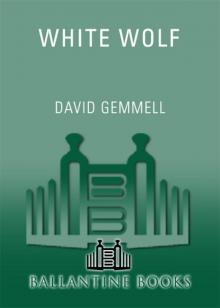 White Wolf
White Wolf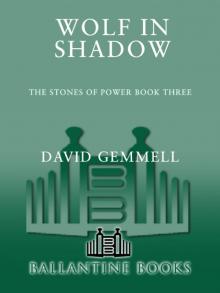 Wolf in Shadow
Wolf in Shadow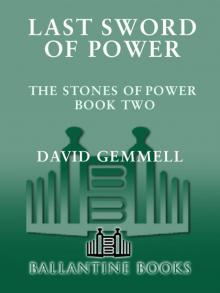 Last Sword of Power
Last Sword of Power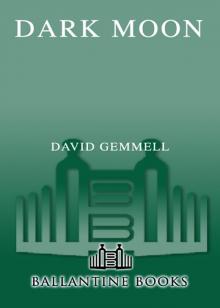 Dark Moon
Dark Moon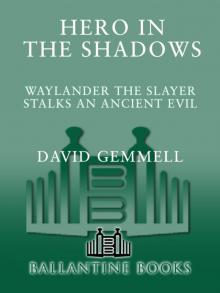 Hero in the Shadows
Hero in the Shadows Gemmell, David - Drenai 09 - Hero In The Shadows
Gemmell, David - Drenai 09 - Hero In The Shadows Waylander
Waylander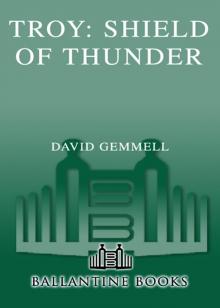 Shield of Thunder
Shield of Thunder Stormrider Stormrider
Stormrider Stormrider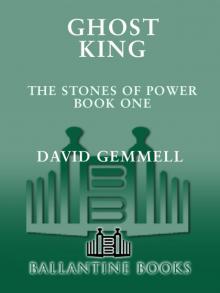 Ghost King
Ghost King Legend
Legend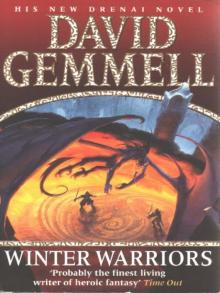 Winter Warriors
Winter Warriors Fall of Kings
Fall of Kings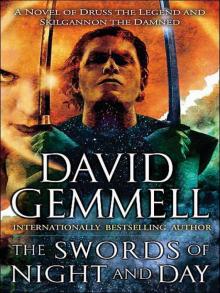 The Swords of Night and Day
The Swords of Night and Day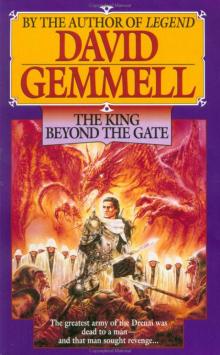 The King Beyond the Gate
The King Beyond the Gate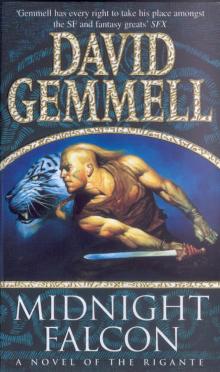 Midnight Falcon
Midnight Falcon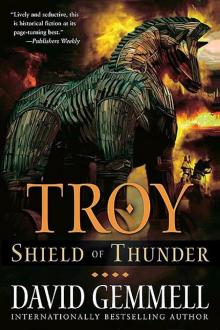 02 - Shield of Thunder
02 - Shield of Thunder In the Realm of the Wolf
In the Realm of the Wolf Ravenheart
Ravenheart The First Chronicles of Druss the Legend
The First Chronicles of Druss the Legend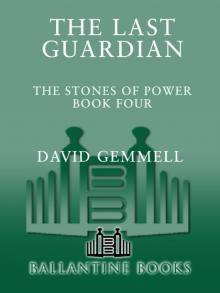 Last Guardian
Last Guardian Stormrider
Stormrider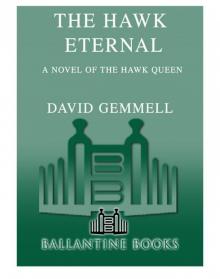 The Hawk Eternal
The Hawk Eternal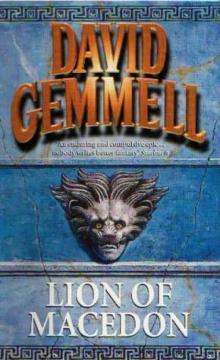 Lion of Macedon
Lion of Macedon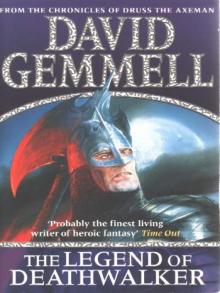 The Legend of Deathwalker
The Legend of Deathwalker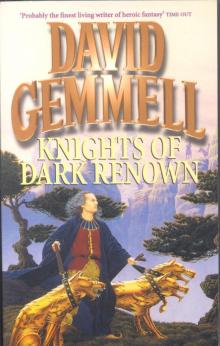 Knights of Dark Renown
Knights of Dark Renown Echoes of the Great Song
Echoes of the Great Song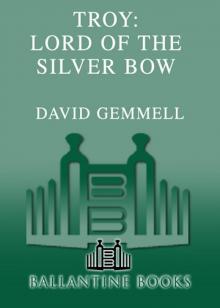 Lord of the Silver Bow
Lord of the Silver Bow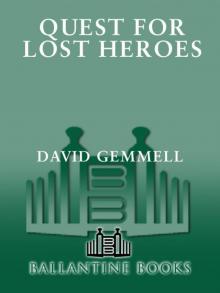 Quest for Lost Heroes
Quest for Lost Heroes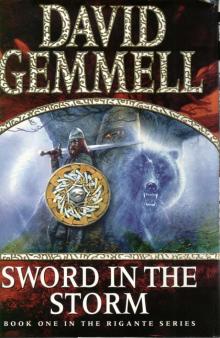 Sword in the Storm
Sword in the Storm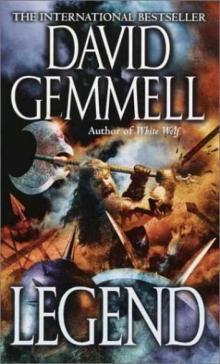 Drenai Saga 01 - Legend
Drenai Saga 01 - Legend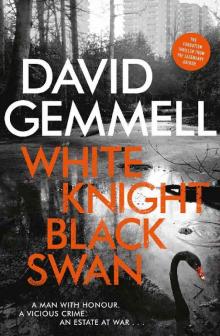 White Knight/Black Swan
White Knight/Black Swan![[Troy 02] - Shield of Thunder Read online](http://i1.bookreadfree.com/i/03/19/troy_02_-_shield_of_thunder_preview.jpg) [Troy 02] - Shield of Thunder
[Troy 02] - Shield of Thunder Lord of the Silver Bow t-1
Lord of the Silver Bow t-1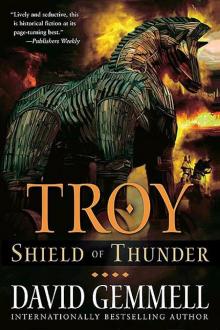 Shield of Thunder t-2
Shield of Thunder t-2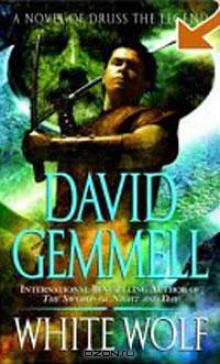 White Wolf: A Novel of Druss the Legend dt-10
White Wolf: A Novel of Druss the Legend dt-10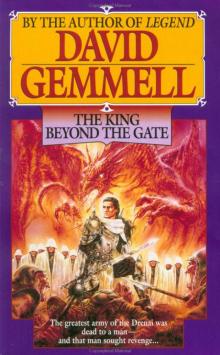 Drenai Saga 02 - The King Beyond the Gate
Drenai Saga 02 - The King Beyond the Gate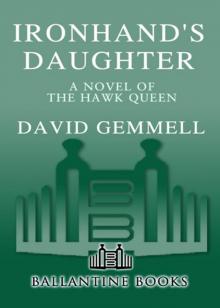 Ironhand's Daughter
Ironhand's Daughter Gemmell, David - Drenai 06 - The First Chronicles of Druss the Legend
Gemmell, David - Drenai 06 - The First Chronicles of Druss the Legend The Last Guardian
The Last Guardian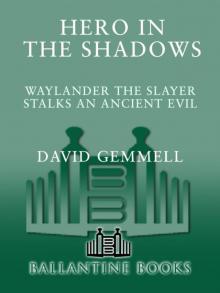 Hero in the Shadows: A Waylander the Slayer Novel
Hero in the Shadows: A Waylander the Slayer Novel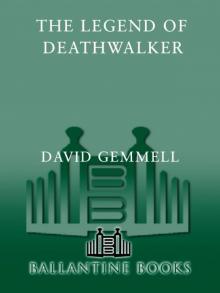 The Legend of the Deathwalker
The Legend of the Deathwalker